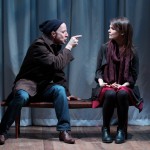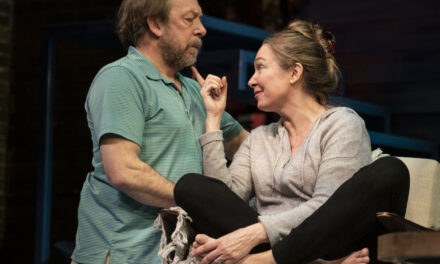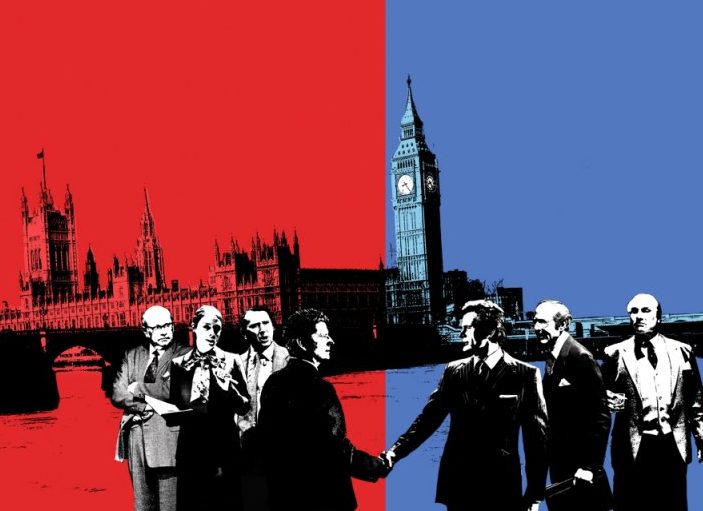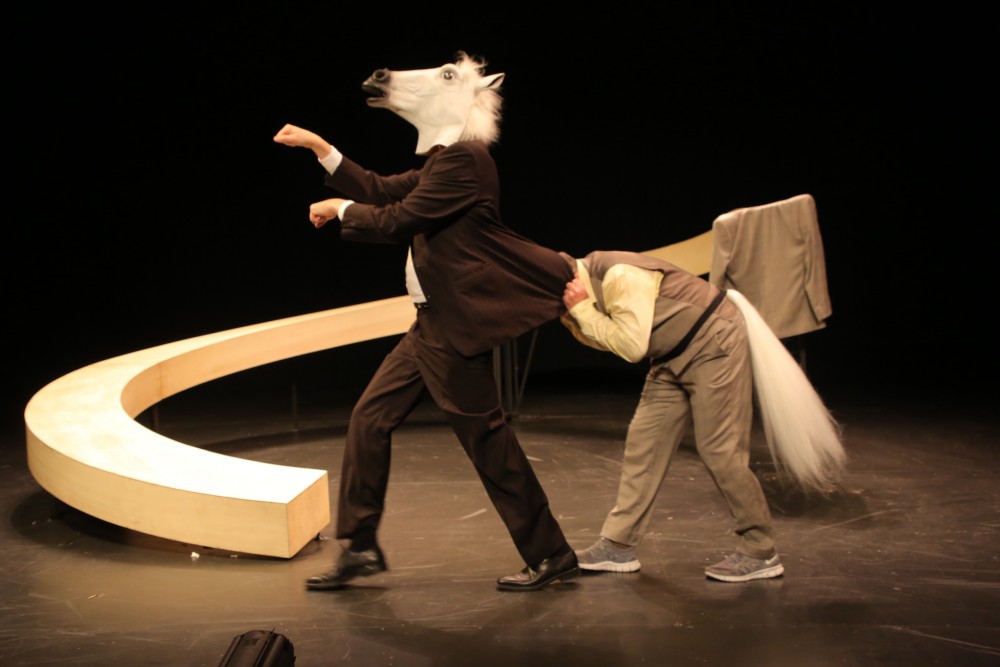by: JK Clarke
For a play about the ravages of addiction to be impactful it is helpful for us to know the character before he or she has become immersed in the problem and to know that they have some redeeming human characteristics or relatable qualities. Unfortunately, that is not the case with Ode to Joy, now playing at the Cherry Lane Theater. Instead, we are plunged right into the middle of the addictive, chaotic lives of these unpleasant people.
When we meet Adele (Kathryn Erbe) she’s a painter, whose every motion causes her to cry out in pain. But rather than take us through that pain, she takes us back in her life to where she meets Bill (Arliss Howard) crying in a bar. Bill garners immediate sympathy from Adele, and before long they are at his place in the midst of an alcohol- and drug-fueled sexual escapade. Both seem like interesting people (if a little insecure) and, though their initial hookup is a drunken, sloppy mess, it seems like they could potentially be partners in a compelling, compassionate relationship. But then we are introduced, via flashback, to Mala (Roxanna Hope), Adele’s former partner. It is here that we start realizing that Adele has issues.
Though we don’t necessarily recognize signs that Adele has addiction issues, the evidence is right before us: the inebriated hook-up with the drunk guy in the bar; the nips at a flask while her lover is in the hospital. At first glance, it’s possible she could be just a self-medicating good-time girl. But then we are hit (via the Amends step in her AA program), in more flashbacks, with the many addictive components of her life. What’s apparent, after a time, is that Adele has ruined many a relationship, she’s not just the shut-in painter she tries to tell us she is. And now she’s about to ruin her relationship with Bill.
The actors in the play do their job admirably, considering that the material they’re working with is not terribly strong. An occasional snarky, clever line is snuck in between mostly cliché and largely hard-to-swallow dialog; yet, it is delivered expertly. In the hands of lesser actors, the play would be a total disaster. Too much of it feels like the etchings of someone in recovery attempting to work out some rather serious internal, personal issues. Adele tells us at the outset that, “This is the story of how the pain goes away. Or: how I got out of the way . . . of me and everyone else . . .” An obvious reference to getting sober. And it feels like we go through the process with her. In recent interviews, writer/director Craig Lucas has stated that the play was inspired by his own struggles with drugs and alcohol in recent years. It shows. Too much of the conflict feels overly personal. Lucas is an accomplished and award-winning writer, but he has gone too far inside himself here. No doubt going through Alcoholics Anonymous is part of a very large and difficult struggle, but either people are already intimately familiar with the process, or have no desire to know. This is a painful play with difficult subject matter, but somehow we don’t end up caring or wanting to know more.
Lucas, in this production, got lucky with a tremendous cast who work through some ho-hum dialog that, on its own, just staggers: “You don’t have prostate cancer, Bill . . . I can just tell. You are a winner . . . Let’s just say I have powers,” Adele tells Bill. And much of the dialog is disconcerting — actors continually interrupt and cut each others sentences short; it’s a gimmick, but not one that feels right in this case. And Bill, a heart surgeon, is such a drag that he continually spouts aphorisms and unenlightened (but self-assured) references to everyone from Kierkegaard to Jesus Christ. Everyone’s a blowhard, but some, like both of Adele’s lovers, are just overly-dramatic bores. The takeaway, though probably unintended, is that Adele chooses lousy lovers, and she, despite her devotion, is a lousy partner as well.
Oddly enough, the standout feature of the play was the various “accident” choreographies. Co-Fight Directors David Anzuelo and Jesse Geguzis did an admirable job with the many scenes that required actors falling on glass, on each other or simply falling out of chairs. Erbe, Howard and Roxanna Hope (Mala) displayed remarkable skill with their physical performances. It’s a pity they didn’t have a stronger script to prop them up.
*Photos: Sandra Coudert
Ode to Joy. Through March 30 at the Cherry Lane Mainstage (30 Commerce Street). www.rattlestick.org























